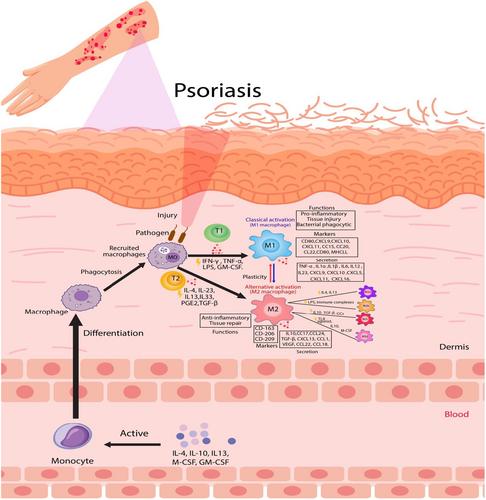The M2 Macrophages Importance Role in Psoriasis
Abstract
Background
Psoriasis is a chronic autoimmune skin condition that is increasingly prevalent globally, causing significant challenges for affected individuals. The disease is influenced by a combination of genetic factors, environmental triggers, immune system dysfunction, and its systemic nature with comorbidities like cardiovascular diseases and depression. Macrophages, essential immune cells, play a critical role in the pathogenesis of psoriasis, displaying various functions and activation states.
Objective
This study aims to investigate the impact of M2 macrophages on the progression and management of psoriasis, particularly their ability to support tissue healing and reduce inflammation.
Results
M1 macrophages are involved in early inflammation and pro-inflammatory responses when activated by LPS and IFN-γ, while M2 macrophages are activated by IL-4 and IL-13 to promote anti-inflammatory and tissue repair processes. Imbalance in M1 and M2 polarization can worsen autoimmune conditions such as psoriasis, underscoring the need to regulate macrophage phenotypes for effective disease management. Recent research suggests that targeting M2 macrophages could be a promising therapeutic approach for treating psoriasis, especially through advanced biologic treatments such as anti-IL-17 and anti-IL-23 therapies. Enhancing the function of M2 macrophages has been shown to reduce inflammation and improve outcomes in psoriatic conditions, potentially lowering the risk of comorbidities through early intervention and personalized treatment. Biomarkers like CD163(+) M2 macrophages are associated with disease progression, while treatments that enhance M2 macrophage function, such as PSORI-CM02 and Treg-of-B cell therapies, show potential in alleviating psoriasis symptoms.
Conclusion
Understanding the crucial role of M2 macrophages in psoriasis could pave the way for innovative treatment approaches that regulate immune responses and enhance patient care. Further exploration of macrophage biology in psoriasis may provide fresh perspectives on personalized therapeutic options for managing psoriasis and other inflammatory skin conditions, ultimately improving patient care and quality of life for individuals with this chronic skin condition.


 求助内容:
求助内容: 应助结果提醒方式:
应助结果提醒方式:


